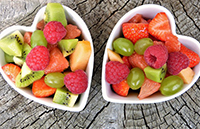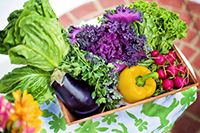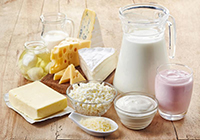In the beginning of your pregnancy, your doctor may have provided you the list of all those foods and beverages that are safe and unsafe for you and your baby. After delivery, your diet may become less strict but as you are breastfeeding your baby there are still some dietary restrictions that you must follow for proper nourishment and development of your baby.
Self-care is critical to ensure that you get adequate energy as well as emotional resources to take the best care for the baby. We have compiled a detailed list of foods that you should eat or avoid at the time of breastfeeding.
Things To Eat At The Time Of Breastfeeding
Breastfeeding involves energy so new moms should intake an extra 450 to 500 calories daily than what they were taking in their regular diet. A healthful and nutritious breastfeeding diet will prevent you from getting tired.
It has to have specific nutrients, like iron, potassium, calcium, vitamins A, vitamin D, and healthy fats. Eating combination of healthy foods is essential as it provides all nutrients to the baby and also exposes him to various tastes. This way, as your baby grows, he/she will become more receptive towards solid foods.
There is no need of a special diet at the time of breastfeeding, but you should eat all that you need to remain nutritionally balanced. This implies variety of vegetables, fruits, whole grains that includes oats, cereals, wholegrain breads, and brown rice. Also include boiled potatoes as they have plenty of starch that provides abundant energy to your body.
When making a diet plan, you need to know that what worked for another nursing mother may or may not work for you. This is because we all are designed to be genetically unique. Our bodies are different. Your goal should be to consume a healthful, and varied diet. Below is the list of foods that are beneficial to be included in your daily meal:
 Fruits: Fruits are one of the best sources of vitamins, and minerals in your diet. Out of all fruits, oranges, grapefruit, cantaloupe, bananas, apricots, mangoes, and prunes comprise of good amounts of vitamin A, potassium and fiber that are necessary in breastfeeding phase. It is recommended to eat two servings of different types of fruits daily. The high fiber content in fruits also helps to relieve constipation.
Fruits: Fruits are one of the best sources of vitamins, and minerals in your diet. Out of all fruits, oranges, grapefruit, cantaloupe, bananas, apricots, mangoes, and prunes comprise of good amounts of vitamin A, potassium and fiber that are necessary in breastfeeding phase. It is recommended to eat two servings of different types of fruits daily. The high fiber content in fruits also helps to relieve constipation.
 Vegetables: Like fruits, vegetables are also a good source of vitamins and antioxidants. When you eat them in adequate amounts, it helps in replenishing the nutrients that are used by the body to produce milk.
Vegetables: Like fruits, vegetables are also a good source of vitamins and antioxidants. When you eat them in adequate amounts, it helps in replenishing the nutrients that are used by the body to produce milk.
Your doctor may have put you either on exclusive breastfeeding or breastfeeding with formula-feeding. Women in the first category should eat three cups of vegetables per day and those who are in the latter category should eat two and a half cups of vegetables per day.
Some of the most advised vegetables in breastfeeding stage are spinach, kale, carrots, sweet potatoes, tomatoes, collards, pumpkin, and red sweet peppers. All of these healthy vegetables have high amounts of vitamin A and potassium in them that are vital for the sound development of your baby.
 Protein: When you are breastfeeding, your body twenty-five more grams of protein daily. This is required for the development of the bones, muscles, and brain of the baby. Lean protein sources that are devoid of unhealthy fats and carbs are the ideal inclusion in your diet.
Protein: When you are breastfeeding, your body twenty-five more grams of protein daily. This is required for the development of the bones, muscles, and brain of the baby. Lean protein sources that are devoid of unhealthy fats and carbs are the ideal inclusion in your diet.
Some of the healthy sources are eggs, pork, chicken, lamb, lentils, nuts, seeds, oysters, beans, olive oil, pulses, peas, avocados, and lean beef. Include protein with every meal. When considering sea food, choose salmon, trout and sardines, as they are excellent choices of healthy omega 3 fats, and have low levels of mercury.
 Dairy: Milk and milk products are good source of calcium and protein that are needed for the mother as well as the baby. Pregnancy and breastfeeding can deprive bones from the much-needed calcium. This can lead to osteoporosis. It is thus required to replenish the body with the lost levels of calcium by including these foods in the right amounts in the diet.
Dairy: Milk and milk products are good source of calcium and protein that are needed for the mother as well as the baby. Pregnancy and breastfeeding can deprive bones from the much-needed calcium. This can lead to osteoporosis. It is thus required to replenish the body with the lost levels of calcium by including these foods in the right amounts in the diet.
Some of the advisable dairy products includes milk, homemade cheese, and curd. Three servings of these products are ideal for sound health of baby and the mother. In addition to dairy, dark leafy vegetables, beans, and invigorated orange juice also have high amounts of calcium in them. Women who are breastfeeding needs to consume approx. 1,000 mg of calcium on a daily basis.
Grains: Grains such as quinoa, oats, whole-wheat bread are a potent source of important nutrients. They provide right amounts of carbs and protein to the body that is necessary for the proper development of the baby. Fortified cereals offer added nutrition to the body. Stick to whole-grain cereals that don’t have added sugar in it.
Nutritional Supplements: You can check with the doctor if you would require any nutritional supplement at the time of breastfeeding. A well-balanced diet provides all the necessary nutrients that a breastfeeding mother requires.
Vitamin D, also called as sunshine vitamin, is one of the essential supplements that you should consume for healthy bones of your baby. This vitamin aids in the absorption of calcium in the body. People who live in areas that do not get adequate sunlight, can try compensating for the loss by taking external vitamin D supplements. Dairy, nuts, sesame seeds, leafy greens, cheese, and tofu are some of the dietary sources of vitamin D.
When planning to take a supplement, you should note that supplements are not a substitute for a healthy meal. They are only prescribed when the breastfeeding woman do not get adequate amounts of nutrition from their dietary or herbal supplements.
Water: Water is often overlooked, but it is very important part of the entire breastfeeding diet. It is critical to drink loads of water in the starting few weeks post child delivery. A mother needs more amount of fluids in the body especially when she is breastfeeding the baby.
The extra fluid is needed to make the adequate amounts of breast milk in the body. Along with water, you can hydrate yourself by including other sources of water such as butter milk, coconut water, unsweetened fruit juice, vegetable soups.
Specific foods that increase breast milk production
The following foods helps in higher secretion of breast milk in the body. These are fenugreek seeds, oatmeal, and goat’s rue.
Things to Avoid While Breastfeeding
Now that you have seen what you should eat while breastfeeding, you now need to know the list of harmful foods that you should avoid during breastfeeding. Do not consider as a complete list. Pay attention to specific cues from your baby’s body to determine any specific food/s to which your baby is intolerant or allergic.
Peanuts: People who are allergic to nuts should avoid consuming peanut and foods made from it. The allergy causing compounds present in this nut can transmit through breast milk. If your baby is also allergic to it, then it can cause a peanut allergy in him. Wheezing, hives, and rashes on his baby are the signs that shows that he is allergic to peanuts.
Fish: Though fish has a good reputation of being a healthy source of lean protein, and fats, but when you are breastfeeding, you should eat it in moderation. There are specific varieties of fish, such as king mackerel, and swordfish that have large levels of mercury. It is required to not eat them so that they don’t make their way into the breast milk and harm the baby.
You should choose healthy varieties of fish that are low in mercury levels and devoid of parasites, and bacteria. Salmon, trout and tilapia are considered to be safe and beneficial for your little one.
Coffee and Tea: Caffeine keeps you alert and active, but it is not good for your baby. When you drink beverages that contains caffeine, it goes directly to the baby through the breast milk. This can lead to complications for your baby like difficulty in sleeping. Also, the gentle body of the baby isn’t capable of processing caffeine like adults. So, it is important to stay away from consuming caffeine.
In addition to these two beverages, caffeine is also present in colas, energy drinks and plain chocolate. It is important to talk to your healthcare provider to identify all sources of caffeine that can prove to be harmful during breastfeeding.
Wheat: Wheat is not advisable only for those breastfeeding women who are intolerant towards Gluten. Your baby, if allergic to gluten, can show signs of intolerance in the form of bloody stools, painful tummy, persistent congestion, excessive vomiting, rashes, crying after a breastfeed, explosive stools, reflux, fussiness, etc.
It is important to stay away from these foods to avoid any complications. If the condition is not getting normal even after stopping the intake of wheat, then it is advised to talk to your doctor at the earliest.
There are a few more foods that can cause allergy in the baby. These includes cow’s milk, cruciferous veg, corn, soya proteins, hot sauce, and eggs. Watch out the reaction of baby after you nurse him/her, to learn about signs of food intolerance.
Garlic and Spicy foods: If you are habitual of eating Garlic and /or spicy foods, then you now need to reduce or stop it during breastfeeding. This is because the smell of garlic, and flavor of spicy foods can get into the milk. Due to the smell, your baby may pull off at the time of nursing. Though garlic has known for a wide range of health benefits, it is not appreciated by babies.
Lemon: Lemon should be avoided during breastfeeding as the high citrus levels of the fruit can irritate the gastro-intestinal tract of the baby. To ensure that you get adequate levels of vitamin C from your diet, you can include mild fruits such as mango, pineapple etc.
Chocolate: In addition to caffeine content, chocolates should be avoided in your breastfeeding diet due to its laxative effect. Eating chocolates at this time can disrupt the digestive system of the baby and can lead to runny stools. This symptom has been noticed by several nursing mothers. So, it is best to avoid eating chocolate and save yourself from the associated discomfort.
Specific Herbs: Certain herbs such as sage, parsley, and peppermint have been used since ancient times to add flavor to the meals. But when you consume them during breastfeeding, they can cause a negative impact on the milk supply. Though Parsley and peppermint gives a fabulous taste to your tea, they can lower the milk supply. If you notice that your baby remains hungry after feeding, you will need to either reduce or stop using these herbs in your diet.
Gas causing Foods: There are certain foods such as cabbage, brussels, beans, broccoli, sprouts, cauliflower that can cause buildup of gas within your body. They can lead to burp, passing of gas, and even bloating in babies after you consume them. So, it is best to avoid including these foods in your diet.
Dairy: Some babies have lactose allergy. They may not respond well to dairy products. If you find that your baby is acting fussy after feeding, or develop eczema or other types of issues like poor sleep or skin ailments, then it could be due to presence of lactose in the breastmilk. Eliminating dairy products from the diet can help in relieving from this distress in the baby.
Specific Medicines: Certain medicines are considered to be safe to consume in breastfeeding, while others are not. A small amount of these medicines gets into the breast milk and can lead to undesirable consequences. The types of medications that you should avoid are:
- Acebutolol
- Antihistamine
- Decongestant like Dimetapp
- Narcotics
- Doxepin
- Thiazide diuretics
Alcohol: Alcohol is harmful and strictly not advised for you as well as the baby during pregnancy and breast feeding. According to health experts, it is safest to avoid it till the baby gets more than three months old.
If you have been habitual of drinking it, and can’t stop it all of a sudden, then it is required that you reduce the amount of alcohol and consume it only during specific occasions. Moderation and timing are the two important factors that you should consider at the time of consuming alcohol.
Normally, when alcohol reaches into your body, it takes anywhere between one to two hours to get metabolized. If you can’t stop it altogether, and want to drink a little amount, then drink it right after nursing the baby. In one to two hours, it will get metabolized and won’t be present in your bloodstream and breastmilk. In this way, you can be assured that it would not make its way into the baby’s body via breastfeeding.
You should also need to know that alcohol has the potential to lower the milk yield by some percentage. Though this reduction in milk production is temporary. Once you stop consuming alcohol, your body will again start to produce it in normal amounts.
Conclusion
In the initial phase of motherhood, you can find breastfeeding to be a challenge. Many new moms feel overwhelmed learning to master breastfeeding that they fail to pay attention to their diet. This negligence eventually harms the health of the baby.
It is important to note that the health of the baby is dependent on the overall wellness and health of its caregivers. Thus, proper nutrition is vital not just for babies, but also for breastfeeding mothers.

